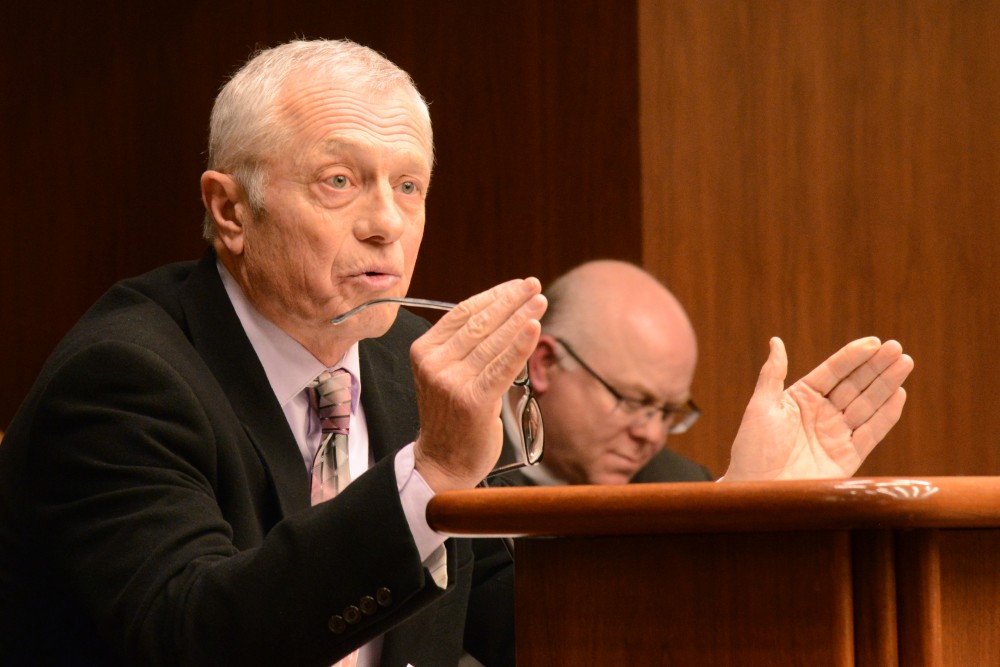Student leaders say that their input on Board of Regents candidates has been ignored by legislators.
As the field of candidates has been narrowed to four finalists — four white men and all current or former regents — student leaders have expressed concern that their input on candidates has been ignored, leading to worries about an increased gender imbalance and lack of diversity on the board.
Earlier this month, about 30 student leaders from four of the University of Minnesota campuses sent their rankings of the candidates to the chairs of the Senate and House higher education committees.
“We wanted to reach out to our representatives to make sure that they knew not only the candidates [we wanted] … but the values we hope to see in the board,” said Trish Palermo, Student Senate Consultative Committee chair and Minnesota Student Association presidential candidate. “However the recommendations came out … and the values were definitely not taken into consideration.”
Legislators will elect four new board members Wednesday.
The board currently has eight men and four women, but will lose one when Laura Brod vacates her seat after the election. It has two nonwhite members.
Out of the 13 candidates sent by the Regent Candidate Advisory Council, which screens and recommends a pool of candidates to the legislative committee, two were female and none were people of color.
Out of the top ranked candidates in the letter, current board vice-chair David McMillan and current regent Thomas Devine were forwarded by a joint legislative committee. In the third congressional district seat, the committee voted to nominate current regent Darrin Rosha — the student leaders’ lowest ranked option for that seat.
Rep. Bud Nornes, R-Fergus Falls, chair of the House higher education committee, said their options for making the Board more diverse were limited because of the selection the RCAC forwarded to them.
Nornes said the committee considers factors like candidates’ likability, leadership skills and previous experience. Student input is appreciated, he said, but doesn’t play a big role in the decision.
“I’m trying to recall the letter off the top of my head,” he said. “It didn’t have any direct bearing on the final selection.”
Nornes said he tries to focus on the best candidates overall, rather than prioritizing a diverse board.
“Those quotas to me are just something that I don’t worry about. I should maybe, but I don’t,” he said.
While Rep. Gene Pelowski, DFL-Winona, said he hadn’t read the letter before the Feb. 7 vote, he shares the same diversity concerns as students.
“The overriding issue is the [Republican] majority will do what they’re going to do … they’re going to vote in who they want,” Pelowski said.
RCAC concerns
Some said the RCAC may need to improve its processes to factor in student input and enable the board to be more diverse.
Minnesota Student Association president and RCAC member Abeer Syedah said the board was not focused on representation.
“I don’t believe the RCAC, as a whole, was hyper-concerned with the issue of equitable representation,” she said. “I wouldn’t say it’s race and gender blind . . . but we weren’t looking at any boxes about the persons’ racial or gender identity at all.”
She said the makeup of the RCAC itself was problematic, but can’t be singled out as the sole problem.
“It’s not like the RCAC was the problem, or the applicant pool, or the Legislature. They all collectively came together,” Syedah said.
She did not participate in the post-interview voting process, because she was studying abroad.
RCAC member Terri Bonoff said this damaged the student input in the process.
“Everyone has an equal vote, and so that she was not there really hurt your students,” she said. “I was really disappointed.”
Syedah said that she tried to find a way to vote remotely, but that it wasn’t an option.
RCAC chair Ardell Brede said a lack of diverse applicants contributed to the candidate pool.
He said the committee needs to improve their recruiting efforts.
“We’ve got to make sure they understand that door is open for them, the same as anybody else,” Brede said.
Student concerns
Students say that the gender imbalance and lack of diversity on the board influences its decisions.
Callie Livengood, who served as student chair to the board last school year, said its decision to delay approving the school’s affirmative consent policy in July 2015 is an example of the board’s makeup impacting its actions.
“Whenever I brought up issues like sexual assault, [female regents] are one of the first ones to believe you, because they have similar experiences to yours,” she said. “As much as [the regents] try not to, their backgrounds do influence the way they act.”
Livengood said the committee’s decision to move the four candidates forward was disappointing.
“It’s upsetting that we’re recommending four typically white men who don’t represent … students at this university,” she said.








